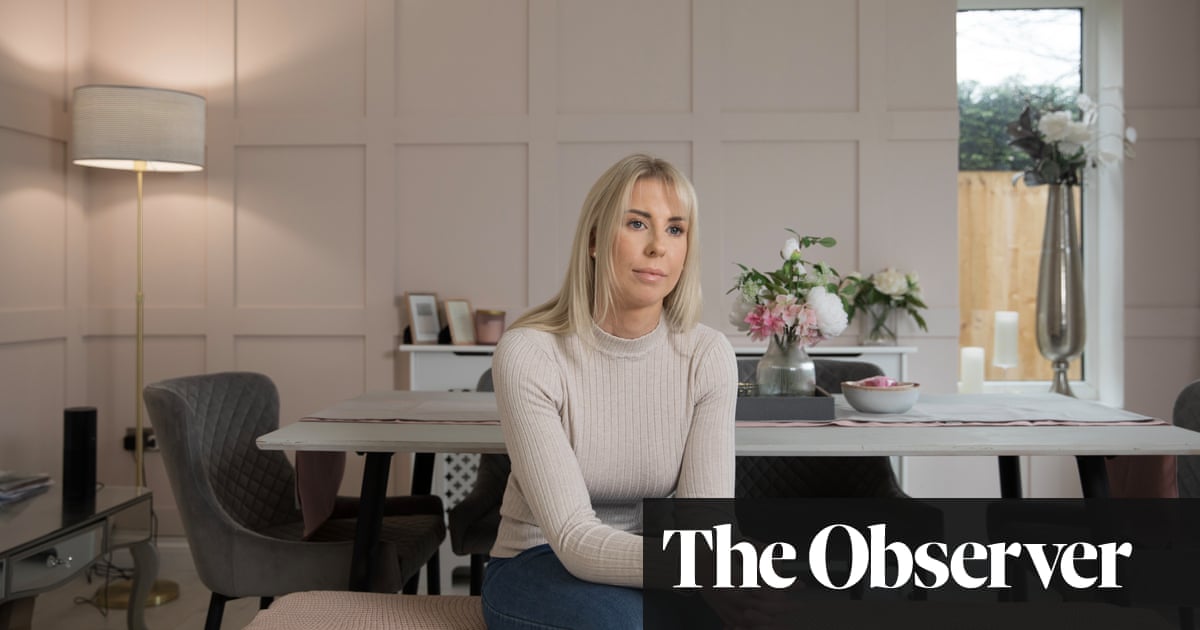
hen the high priestess of commodified minimalism, Marie Kondo, encouraged her followers to gut their book collections and keep only the handful of volumes that “spark joy”, Irish-Canadian author Anakana Schofield led the bibliophilic counter-insurgency. “Literature does not exist only to provoke feelings of happiness or to placate us with its pleasure,” she wrote in the Guardian in January. “Art should also challenge and perturb us.”
Schofield is an unabashed agitator, a conjurer of discomfort: whether it’s the agonised mind of a sex offender, or the sorrows of a disintegrating marriage. Like her absurdist compatriots – Beckett, Joyce, O’Brien – Schofield’s novels are existentially confounding, syntactically wild, and buckshot with wit. And while she may behave like a form wrecker, she is at heart a world builder. Each of her novels inhabits the same literary universe she created in her debut, 2013’s Malarkey, a funhouse mirror reflection of contemporary Irish life.
We first met Bina (“That’s Bye-na not Bee-na”), the eponymous heroine of Schofield’s third novel, in that debut seven years ago, brandishing a hammer on the tarmac of Shannon Airport during an anti-war protest. It’s a peripheral scene in Malarkey, but it is hard to forget an enraged septuagenarian clobbering a plane with a hand tool. The “bonkers” Bina made such an impression on one early reviewer that Schofield was inspired to give her a standalone tale.
“The reason I attacked the plane was nothing to do with politics or protest or war at all,” Bina now has the chance to explain, “it had everything to do with Eddie.” Eddie is Bina’s “sorta son” – not her biological child, but a long-unwelcome hanger-on (“the kind of son you’re landed with because no beggar wants to be bothered with him”). He’s recently absconded to Canada, leaving Bina with the ever-looming terror that he might return. “I wouldn’t want him dead tho’,” she tells us. “Because it might be up to me to bury him and it would be an awful lot of work.”
It will take time to learn how this “ordeal creator” wheedled his way into Bina’s life, and how she finally managed to pry him loose. We’ll also have to figure out why it is that Bina’s front yard is full of picketing activists (and some dead ducks); her back yard is full of medical waste; and the police are investigating her over the death of her best friend, Phil – Philomena, the unravelling, misbehaving heroine of Malarkey.
What we do know is that 74-year-old Bina has had enough. She’s “seen some things” and it’s time for a lie down (“maybe there comes a time in every woman’s life to lie down”). Bina reports to us from bed where, sustained by ginger cake and visited by dreams of a half-man, half-penguin David Bowie, she spends her waking hours scrawling urgent notes to anyone and everyone – or perhaps to no one at all. She is transforming her grand misfortunes and regrets into strident, hard-won advice; making something practical of her heartbreak (“there’s nothing I like more than to be useful”). As the warnings accrete, a narrative emerges: is it a confession or an elegy? Is there any difference? “If you write out everything you think they’ll think it’s everything you did,” she cautions. “Rather than everything you thought about doing.”
The dimensions of the paper Bina has to hand shapes the novel – she writes her warnings on the backs of utility bills and used envelopes. “Receipts are ... easy to come by. I have thousands of them despite having so little money to spend.” Her words often march in counterfoil columns that read like poems, aphorisms or protest signs: “Know it firm / Know it tall / Know it wide/ I will not shut up / I will not shut up at all ... / So if you are listening to a woman / hoping she’ll shut up / try imagining the 2,000 years / where she did all the listening.”
There is undeniable energy in these scraps of straight-backed, emphatic prose, but the scavenged paper conceit feels unnecessary, a gimmick reverse-engineered to justify Schofield’s stylistic preference for staccato, pointillist storytelling.
Bina is adamant: she is a “modern woman with modern thoughts on modern things”, forthright and practical. Yet Bina is a novel of wilful obfuscation and piecemeal revelations. Whether this is a source of beguiling, cantankerous irony or annoying quirk will depend on the reader. In a novel that works so hard to make older women visible – and their stories feel urgent – it seems counterproductive to embrace a form so repetitive it borders on the doddery.
At its raw best, Bina captures the neural loops of a grief-snagged brain with crow-black humour. Its protagonist is haunted by an inescapable, wrenching paradox: “Those who we want shut of, linger. Those who should remain, don’t.” It’s not a joyful, comforting conclusion, but that was never the point.
Bina is dedicated to “every woman who has had enough”. The novel works to unclench that fist of a word, “enough”. There is power in all forms of its invocation: fury, frustration, exhaustion, surrender; a celebration of abundance; a plea for release. “You will know when you’ve had enough,” Bina assures us. What to do with that knowledge is the great question of our despondent political age – how to make it count, and not just stock up on ginger cake and take ourselves to bed.
• Bina by Anakana Schofield is published by Little, Brown. To order a copy (RRP £14.99) go to guardianbookshop.com. Free UK p&p over £15.












